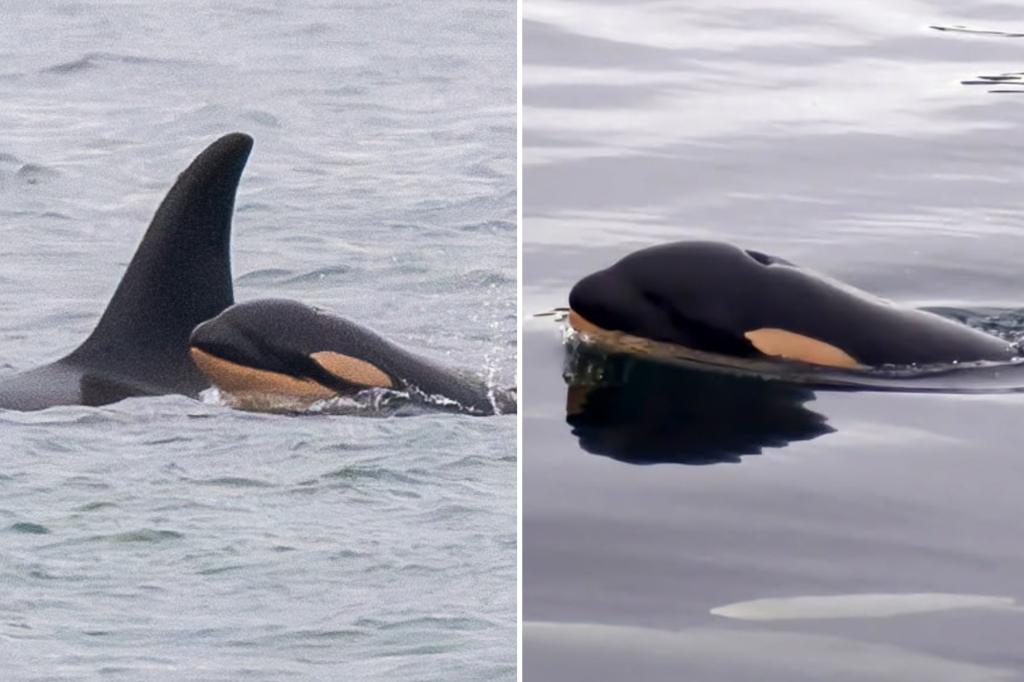A killer whale named J35, known for carrying her dead calf’s corpse for over two weeks in a heartbreaking display of grief, has tragically lost another baby, a female calf named J61. This was the second calf that J35 had given birth to since her first loss in 2018. Concerns were raised by a team of scientists watching the pod due to the behavior of both J35 and J61, signaling potential health issues for the calf. The Center for Whale Research expressed worries about the calf’s survival, noting the high mortality rate for new calves, especially in the first year.
Despite the hopes surrounding the birth of J61, the team confirmed that the new calf had died, leading to a sense of profound sadness among the researchers. Brad Hanson, a biologist with the National Oceanic and Atmospheric Administration, emphasized the significance of the loss of a female calf for the potential recovery of the critically endangered southern resident killer whale population. However, a glimmer of hope emerged with the discovery of another calf born into the pod, although details about its mother and gender have not been confirmed. The uncertainty surrounding the fate of this new calf adds to the ongoing concerns about the survival of the species.
The southern resident killer whale pod, which consists of 75 members as of December 2023, faces various threats in their habitat in the Pacific Ocean between Washington state and British Columbia. These threats include vessel noise and disturbances that disrupt their hunting abilities, pollution affecting their food sources, and a general lack of available food. These challenges contribute to the declining population of the killer whales and raise concerns about their long-term survival. Efforts to protect and conserve the species are ongoing, with researchers monitoring the pod closely to track their numbers and behavior.
The story of J35 and her calves highlights the emotional complexity and challenges faced by killer whales in the wild. The deep bond between mother and calf is evident in J35’s behavior as she grieves for her lost offspring, reflecting the profound impact of loss within the pod. The resilience of the killer whales is also apparent in the birth of new calves, offering a glimpse of hope for the future of the species. As researchers continue to study and protect the southern resident killer whales, the importance of addressing the various threats they face becomes increasingly urgent to ensure their survival in the wild.
The loss of J61 underscores the fragile nature of life for killer whale calves and the ongoing struggle for survival in a changing and challenging environment. The mourning behavior observed in J35 following the deaths of her calves serves as a poignant reminder of the emotional lives of these intelligent creatures and the impact of loss within their social groups. The scientific monitoring of the pod provides valuable insights into the health and well-being of the killer whales, informing conservation efforts aimed at preserving their population and habitat. The discovery of a new calf offers a beacon of hope amid the sorrow, signaling the potential for growth and renewal within the pod.
As researchers and conservationists work to address the various threats facing the southern resident killer whales, including pollution, noise pollution, and food scarcity, the challenges of ensuring their survival remain paramount. The interconnectedness of environmental factors and human activities underscores the need for collaborative efforts to protect these iconic marine mammals and their habitats. By raising awareness about the plight of the killer whales and advocating for measures to safeguard their future, a path towards coexistence and preservation can be forged. In the face of adversity, the resilience and adaptability of the southern resident killer whales offer inspiration for ongoing conservation initiatives and a renewed commitment to upholding the rich biodiversity of our oceans.















